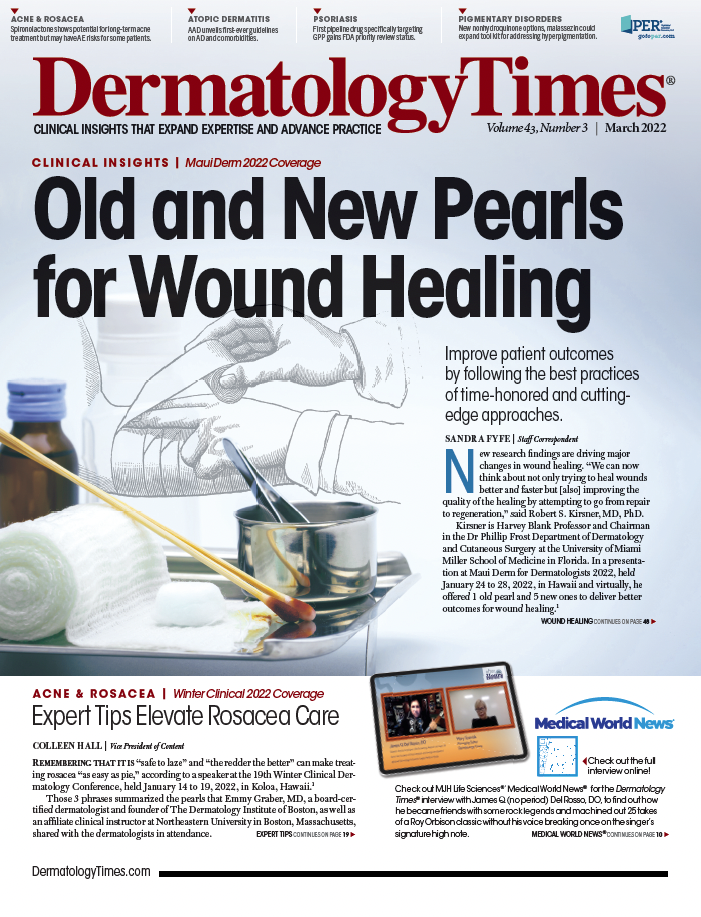- Case-Based Roundtable
- General Dermatology
- Eczema
- Chronic Hand Eczema
- Alopecia
- Aesthetics
- Vitiligo
- COVID-19
- Actinic Keratosis
- Precision Medicine and Biologics
- Rare Disease
- Wound Care
- Rosacea
- Psoriasis
- Psoriatic Arthritis
- Atopic Dermatitis
- Melasma
- NP and PA
- Skin Cancer
- Hidradenitis Suppurativa
- Drug Watch
- Pigmentary Disorders
- Acne
- Pediatric Dermatology
- Practice Management
- Prurigo Nodularis
- Buy-and-Bill
Publication
Article
Dermatology Times
Answers to Your Patients' Questions on Skin Care
Author(s):
Targeting skin care regimens to the individual patient is most likely to yield compliance to a recommended routine.
Patients are looking for a holistic approach to their skin care and taking the time to review with your patients what they are using on their skin, as well as counseling about their lifestyle relating to diet, exercise, sleep, and stress can go a long way to helping them address their skin concerns, according to a speaker at Winter Clinical Dermatology Conference, held this week in Kauai, Hawaii.
“I sit down with my patients and try to make it easy,” Diane S. Berson, MD, of Weill Cornell Medical College, told the audience. “I have found that if I keep it basic and explain to them what the ingredients are doing, and write out their regimen, they will comply and see the benefits.”
Berson said the most common issues cited by her patients include concerns over redness, discoloration, aging, acne, and hair growth issues. For patients with any of these concerns, she stresses the importance of protection during the day, with items like antioxidants and sun protection, and at night, repairing the skin with retinols.
For “day” care, Berson discussed the importance of encouraging moisturizer use, including for patients who are using retinoids for things like acne. She cited previously published data that showed patients who used a hydrating moisturizer first under their retinoid did not get irritated with the retinoid use and were more compliant with the regimen. There are a range of moisturizer options including emollients that contain ceramides and humectants that contain glycerin.
Discussing sun protection, Berson noted, “This is important for all your patients, particularly for those with acne and rosacea.” She said that it is important to stress the importance of sunscreen use, but if the patient expresses concerns about certain chemicals in sunscreens, that the dermatologist can encourage mineral-based products.
She also tailors her advice to particular groups, noting that she’s seen an uptick in millennials coming to her seeking advice about skin care.
“They are being targeted to buy certain skin care products, and they are buying them, so I will look at the products with them, and if the active ingredients are ones I approve of, I recommend them if they like them,” she said. She said younger patients often ask her about using a moisturizer, sunscreen, and makeup if they have acne or rosacea, and she takes that question as an opportunity to discuss a good skin care regimen, combined with mineral makeup that deflects light.
Along those same lines, Berson said it’s common for younger patients to question their dermatology about “clean” skin care options.
“A lot of our patients are looking for natural, cleaner alternatives… they don’t want parabens, formaldehyde, sulfates in their products,” she said. As such, there is an explosion of products now on the market that are “plant based,” including topical cannabinoid-based products. But, she said, it’s important to advise patients that certain plants can put them at risk of contact dermatitis, so remaining aware of what they are putting on their skin is their best defense against dermatitis flare-ups.
Berson also counsels her patients about the importance of diet in terms of reducing skin problems, and she stresses the benefits of the Mediterranean diet, as a western diet is typically more proinflammatory, affecting the gastrointenstinal flora and increasing inflammation.
Reference:
Berson DS. Cosmeceuticals: Answers to your patients’ questions. Presented at: 2022 Winter Clinical Dermatology Conference; January 14 to 19, 2022; Kauai, Hawaii.







